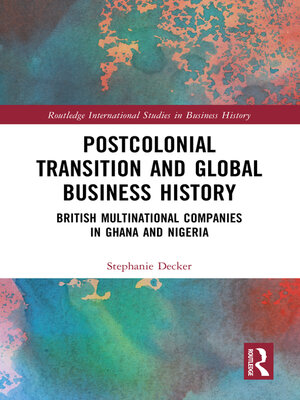Postcolonial Transition and Global Business History
ebook ∣ British Multinational Companies in Ghana and Nigeria · Routledge International Studies in Business History
By Stephanie Decker

Sign up to save your library
With an OverDrive account, you can save your favorite libraries for at-a-glance information about availability. Find out more about OverDrive accounts.
Find this title in Libby, the library reading app by OverDrive.



Search for a digital library with this title
Title found at these libraries:
| Library Name | Distance |
|---|---|
| Loading... |
British multinationals faced unprecedented challenges to their organizational legitimacy in the middle of the twentieth century as the European colonial empires were dismantled and institutional transformations changed colonial relationships in Africa and other parts of the world. This book investigates the political networking and internal organizational changes in five British multinationals (United Africa Company, John Holt & Co., Ashanti Goldfields Corporation, Bank of West Africa and Barclays Bank DCO). These firms were forced to adapt their strategies and operations to changing institutional environments in two English-speaking West African countries, Ghana (formerly the Gold Coast) and Nigeria, from the late 1940s to the late 1970s. Decolonization meant that formerly imperial businesses needed to develop new political networks and change their internal organization and staffing to promote more Africans to managerial roles. This postcolonial transition culminated in indigenization programmes (and targeted nationalizations) which forced foreign companies to sell equity and assets to domestic investors in the 1970s. Postcolonial Transition and Global Business History is the first in-depth historical study on how British firms sought to adapt over several decades to rapid political and economic transformation in West Africa.
Exploring both postcolonial transitions and development discourse, this book addresses the topics with regard to business and economic history and will be of interest to researchers, academics, and students in the fields of organizational change, political economy, African studies and globalization.







